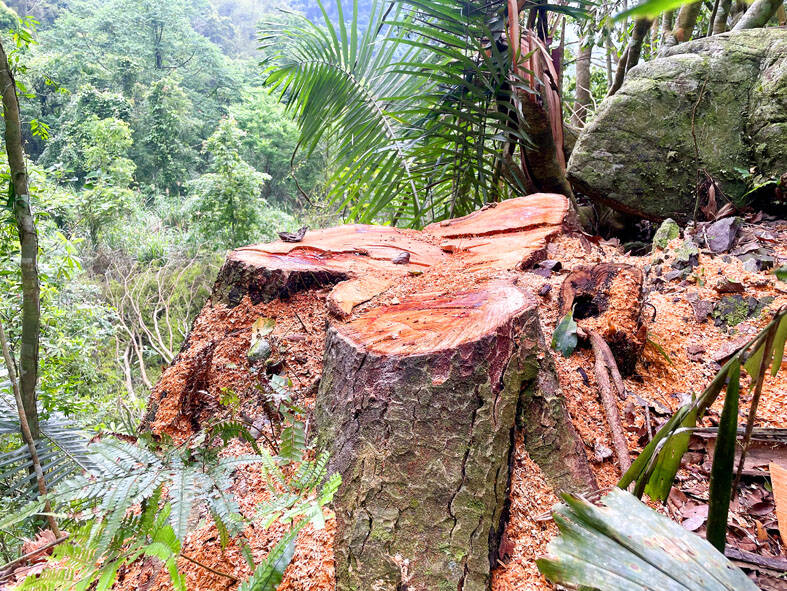The Forestry and Nature Conservation Agency on Tuesday unveiled a Web site to combat illegal logging, encouraging the public to take part in forest protection.
Data from the agency showed that reported illegal logging incidents decreased to 58 cases last year from 290 in 2013.
The agency amended the Forestry Act (森林法) in 2015 and 2021, increasing penalties for illegal logging, agency Director-General Lin Hwa-ching (林華慶) told a news conference.

Photo courtesy of the police
Although illegal logging statistics had been classified, the agency opened it to the public in 2017, in hopes that transparency would promote citizen participation in forest protection, he said.
It has mobilized student volunteers, private hiking clubs and local residents to help prevent illegal logging, with up to 91 mountain communities participating in forest patrols as of last year, Lin said.
Over the past eight years, the agency has shifted its focus from clamping down on illegal logging to preventing such activities, he said.
Illegal logging might seem like a judicial and criminal issue, but it is essentially connected with social and economic problems, Lin said, adding that many illegal loggers — especially frontline workers hired to carry and haul timber — are economically disadvantaged people.
Therefore, illegal logging should be prevented at the source by assisting local residents in establishing stable income through proper usage of forest resources, he said.
Lin also called on people not to buy burl art, as most of it is made from illegally obtained burls.
National Taipei University conservation biology associate professor Chen Shiang-fan (陳湘繁) said that her research team visited 11 prisons nationwide to interview 92 people convicted of illegal logging and analyzed thousands of verdicts.
The research showed that the median linear distance between the loggers’ residence and the illegal logging site was 20km, meaning that many illegal loggers live in areas characterized by the distribution of the tree species they logged, she said.
Where they lived were chosely related to their illegal logging activities, Chen said, adding that nearly one-third of the interviewed prisoners were indigenous people.
The situation was exacerbated by underdeveloped economies in remote areas, dysfunctional families, school dropout problems and substance abuse, she said.
The government must help develop forest economies, and promote transparency of illegal logging information and education to prevent people living in forest areas from engaging in illegal logging, Chen said.
Chuan Chih-hsiang (全志祥), an indigenous representative, said that when he returned to his village in Nantou County’s Danda Bunun (丹大布農) region, he found that illegal logging was common, as poverty drove many people to live on the money earned from it.
The situation improved as the agency began to offer afforestation and forest ranger job opportunities to young indigenous people and helped establish indigenous cooperatives to increase local income, he said, adding that illegal logging declined every year.

The manufacture of the remaining 28 M1A2T Abrams tanks Taiwan purchased from the US has recently been completed, and they are expected to be delivered within the next one to two months, a source said yesterday. The Ministry of National Defense is arranging cargo ships to transport the tanks to Taiwan as soon as possible, said the source, who is familiar with the matter. The estimated arrival time ranges from late this month to early next month, the source said. The 28 Abrams tanks make up the third and final batch of a total of 108 tanks, valued at about NT$40.5 billion

Two Taiwanese prosecutors were questioned by Chinese security personnel at their hotel during a trip to China’s Henan Province this month, the Mainland Affairs Council (MAC) said yesterday. The officers had personal information on the prosecutors, including “when they were assigned to their posts, their work locations and job titles,” MAC Deputy Minister and spokesman Liang Wen-chieh (梁文傑) said. On top of asking about their agencies and positions, the officers also questioned the prosecutors about the Cross-Strait Joint Crime-Fighting and Judicial Mutual Assistance Agreement, a pact that serves as the framework for Taiwan-China cooperation on combating crime and providing judicial assistance, Liang

A group from the Taiwanese Designers in Australia association yesterday represented Taiwan at the Midsumma Pride March in Melbourne. The march, held in the St. Kilda suburb, is the city’s largest LGBTQIA+ parade and the flagship event of the annual Midsumma Festival. It attracted more than 45,000 spectators who supported the 400 groups and 10,000 marchers that participated this year, the association said. Taiwanese Designers said they organized a team to march for Taiwan this year, joining politicians, government agencies, professionals and community organizations in showing support for LGBTQIA+ people and diverse communities. As the first country in Asia to legalize same-sex

MOTIVES QUESTIONED The PLA considers Xi’s policies toward Taiwan to be driven by personal considerations rather than military assessment, the Epoch Times reports Chinese President Xi Jinping’s (習近平) latest purge of the Chinese People’s Liberation Army (PLA) leadership might have been prompted by the military’s opposition to plans of invading Taiwan, the Epoch Times said. The Chinese military opposes waging war against Taiwan by a large consensus, putting it at odds with Xi’s vision, the Falun Gong-affiliated daily said in a report on Thursday, citing anonymous sources with insight into the PLA’s inner workings. The opposition is not the opinion of a few generals, but a widely shared view among the PLA cadre, the Epoch Times cited them as saying. “Chinese forces know full well that